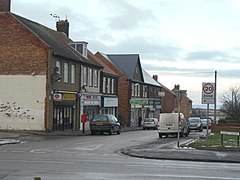world.wikisort.org - United_Kingdom
Lynemouth is a village in Northumberland, England, 3 miles (5 km) northeast of Ashington, close to the village of Ellington to the north west. It was built close to coal mines, including Lynemouth Colliery.
| Lynemouth | |
|---|---|
 Market Square, Lynemouth | |
 Lynemouth Location within Northumberland | |
| Population | 1,858 (2011 census)[1] |
| OS grid reference | NZ295915 |
| Civil parish |
|
| Shire county | |
| Region |
|
| Country | England |
| Sovereign state | United Kingdom |
| Post town | MORPETH |
| Postcode district | NE61 |
| Police | Northumbria |
| Fire | Northumberland |
| Ambulance | North East |
| UK Parliament | |
Lynemouth and the surrounding industrial area featured in the 1985 docudrama Seacoal about the seacoalers who made a living from collecting waste coal from the beach. A series of photographs in the Henri Cartier-Bresson Award–winning[3] book In Flagrante (1988) by Chris Killip shows the work and life of the seacoalers;[4] more were published in 2011 in the book Seacoal.[n 1]
To the south of the village is the former Alcan Lynemouth Aluminium Smelter, now closed, and Lynemouth Power Station.
Governance
Lynemouth electoral ward stretches north along the coast to Craster, with a population at the 2011 Census of 4,842.[5]
Freedom of the Parish
The following people and military units have received the Freedom of the Parish of Lynemouth.
This list is incomplete; you can help by adding missing items. (July 2021) |
Individuals
- Councillor Gillian Thompson MBE: 4 May 2016.
- Mrs. Sarah Hannah "Sadie" Williamson MBE: 4 May 2016.[6]
- Alderman Milburn Irving Douglas: 10 May 2017. (Awarded Posthumously)[7]
In popular culture
The village can be seen in the 2000 film Billy Elliot. Lynemouth Cemetery doubles as Everington Cemetery, in which Elliot's mother is buried.[8] The colliery, demolished in 2005, can be seen in scenes filmed at the cemetery.
Notes
- Chris Killip, Seacoal (Göttingen: Steidl, 2011; ISBN 3-86930-256-9).
References
- "Parish population 2011". Retrieved 29 June 2015.
- "Lynemouth Parish Council". Lynemouth Parish Council. Retrieved 13 July 2021.
- "Chris Killip: Skinningrove: A film by Michael Almereyda", New York Review of Books, 22 July 2014. Accessed 27 November 2014.
- Gerry Badger, Chris Killip (London: Phaidon, 2001; ISBN 0-7148-4028-9), pp. 72–89.
- "Ward population 2011". Retrieved 29 June 2015.
- "Freedom accolades for Gillian and Sadie". Morpeth Herald. 19 June 2016. Retrieved 13 July 2021.
- "Honorary Freemen". Lynemouth Parish Council. Retrieved 13 July 2021.
- "Dying for someone to take care of cemetery; Plea for landowners to clean up overgrown graveyard" - Evening Chronicle, 22 July 2008
External links
- Northumberland Communities (accessed: 10 November 2008)
Другой контент может иметь иную лицензию. Перед использованием материалов сайта WikiSort.org внимательно изучите правила лицензирования конкретных элементов наполнения сайта.
WikiSort.org - проект по пересортировке и дополнению контента Википедии